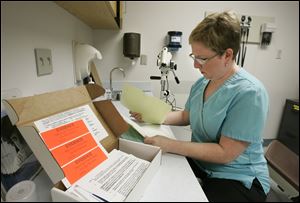
FEATURED EDITORIAL
Delays in DNA
Since March, the Toledo Police Department has submitted nearly 1,000 untested DNA rape kits
8/17/2014
A nurse goes over paperwork from a rape kit in the emergency room at Mercy St. Vincent Medical Center.
Over the past two decades, DNA technology has become an invaluable tool for catching the guilty and exonerating the innocent. That’s why Ohio Attorney General Mike DeWine started calling for old DNA evidence in late 2011, encouraging Ohio’s 800 law enforcement agencies to clear their testable sexual-assault evidence shelves.
It was, frankly, a disgrace that thousands of such kits across the state were gathering dust in police property rooms. Since Mr. DeWine’s appeal, more than 140 police agencies have submitted 8,381 rape kits — nearly half from Cleveland — for testing by the Attorney General’s Bureau of Criminal Investigation.
Click here to read more Blade editorials.
Many of the kits were 10 to 20 years old. More than 4,400 old kits have been tested, slightly more than half the total.
So far, results include 174 rape indictments, Ryan Stubenrauch, a spokesman for Mr. DeWine, told The Blade’s editorial page. Across the country, DNA evidence has exonerated hundreds of suspects who would have otherwise spent years — or decades — in prison.
DNA technology can be wondrous, but it’s useless if it’s not tested. Mr. DeWine deserves credit for pushing the issue, but he has no authority to force police agencies to submit such biological evidence.
Before this year, the Toledo Police Department had sent roughly 300 rape kits for testing. Since March, however, the department has sent nearly 1,000 more, some going back to the 1980s, The Blade editorial page has learned.
TPD spokesman Sgt. Joe Heffernan said the department has roughly 300 old kits left to test. It plans to clear the backlog by the end of the year.
Toledo Police Chief William Moton, who took office in January, is to be commended for placing a high priority on clearing the backlog of untested kits. Still, how promptly these vital kits get tested should not depend on who’s chief.
A sense of urgency about DNA kits should be part of every police force’s culture. As Mr. DeWine has said, every DNA kit should, absent a crime, be tested.
The attorney general has a team of forensic scientists testing current DNA kits, and another dozen scientists working to eliminate the state’s backlog of old kits. That way, wait times for new DNA cases are not prolonged.
During Mr. DeWine’s tenure, the average wait time for DNA testing has dropped from 125 days to 23 days. If necessary, the office can get results within 24 hours.
Last April, a man suspected of raping a 13-year-old schoolgirl in Columbus was arrested two days later, after the attorney general’s office matched his DNA sample in a statewide database within 24 hours.
Meantime, the forensic team working on old DNA kits is testing roughly 300 a month, which means the state’s backlog should be cleared within 14 months.
Once Ohio catches up, it must ensure that protocols and funding — testing each kit can cost more than $1,000 — are in place to prevent future delays. If the problem persists, the state ought to consider legislation that would require law enforcement agencies to submit rape kits for laboratory analysis within a reasonable period — say, six months.
It’s appalling that many rape kits have gathered dust after victims endured invasive tests, which can take hours, to provide evidence to help catch their assailants. Ensuring that DNA kits are tested in a timely matter will require more than added resources. It demands a seismic culture change in police departments.